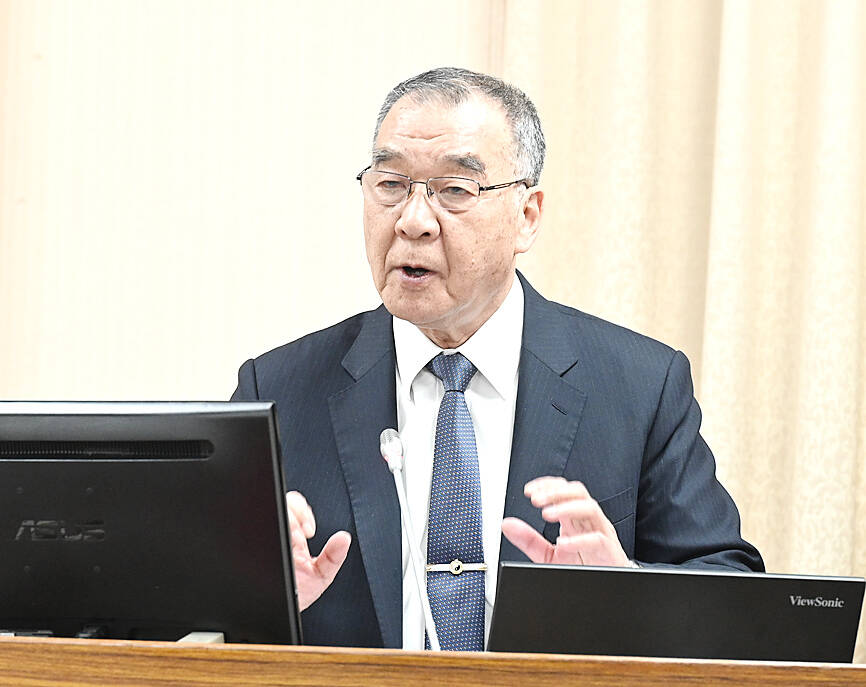Hosting foreign military advisers is within the scope of regular exchanges, Minister of National Defense Chiu Kuo-cheng (邱國正) said yesterday after a US defense media outlet said that US Army Special Forces are to be deployed for training missions in Kinmen and Penghu counties.
Speaking on the sidelines of a legislative session, Chiu told reporters that the armed forces conduct exchanges with foreign militaries to find “blindspots and flaws” in Taiwan’s defense preparations and design, and “to learn from the strengths of others.”
As for the report’s claim that Taiwan’s Aviation and Special Forces Command has proposed buying the Black Hornet Nano, a micro drone that the US military uses, Chiu said there were “no specific talks on procuring arms” in connection with the presence of the US military advisers.

Photo: Wang Yi-sung, Taipei Times
SOFREP, an online outlet founded by US special operations veterans, on Friday last week said that Washington has launched a “significant military collaboration” with Taiwan involving the deployment of special forces in Kimen and Penghu.
Citing the 2023 National Defense Authorization Act, SOFREP said that a growing presence of a liaison element is currently in Taiwan to plan for deploying small detachments of the 1st Special Forces Group’s 2nd Battalion.
The detachments, consisting of three soldiers each, are to become permanent training observers of Taiwan’s elite Airborne Special Service Company and the 101st Amphibious Reconnaissance Battalion, the report said.
The US advisers would be involved in regular training exercises, creating joint operational guidelines and training manuals, and providing instructions for operating the Black Hornet Nano, which Taiwan plans to buy from the US via direct military sale, it said.
The US’ plans mark a departure from the previous practice of dispatching frequent, but impermanent training and observation missions to Taiwan, it said.
Asked to comment at a routine news conference, Ministry of Foreign Affairs North American Affairs Department Director-General Wang Liang-yu (王良玉) said that the “six assurances” and the Taiwan Relations Act form the basis of US security guarantees to the nation, which remain strong.
The ministry has no additional comment on the content of the report, she added.
Su Tzu-yun (蘇紫雲), a fellow at the Institute of National Defense and Security Research, was cited as saying that the US Army Special Forces are known for their defensive prowess.
The integration of the US special forces into Taiwan’s special reconnaissance and amphibious operations units would augment the nation’s capability to counter incursions by hostile forces, the report cited him as saying.

MAKING WAVES: China’s maritime militia could become a nontraditional threat in war, clogging up shipping lanes to prevent US or Japanese intervention, a report said About 1,900 Chinese ships flying flags of convenience and fishing vessels that participated in China’s military exercises around Taiwan last month and in January have been listed for monitoring, Coast Guard Administration (CGA) Deputy Director-General Hsieh Ching-chin (謝慶欽) said yesterday. Following amendments to the Commercial Port Act (商港法) and the Law of Ships (船舶法) last month, the CGA can designate possible berthing areas or deny ports of call for vessels suspected of loitering around areas where undersea cables can be accessed, Oceans Affairs Council Minister Kuan Bi-ling (管碧玲) said. The list of suspected ships, originally 300, had risen to about 1,900 as

Japan’s strategic alliance with the US would collapse if Tokyo were to turn away from a conflict in Taiwan, Japanese Prime Minister Sanae Takaichi said yesterday, but distanced herself from previous comments that suggested a possible military response in such an event. Takaichi expressed her latest views on a nationally broadcast TV program late on Monday, where an opposition party leader criticized her for igniting tensions with China with the earlier remarks. Ties between Japan and China have sunk to the worst level in years after Takaichi said in November that a hypothetical Chinese attack on Taiwan could bring about a Japanese

The WHO ignored early COVID-19 warnings from Taiwan, US Deputy Secretary of Health and Human Services Jim O’Neill said on Friday, as part of justification for Washington withdrawing from the global health body. US Secretary of State Marco Rubio on Thursday said that the US was pulling out of the UN agency, as it failed to fulfill its responsibilities during the COVID-19 pandemic. The WHO “ignored early COVID warnings from Taiwan in 2019 by pretending Taiwan did not exist, O’Neill wrote on X on Friday, Taiwan time. “It ignored rigorous science and promoted lockdowns.” The US will “continue international coordination on infectious

DEEP-STRIKE CAPABILITY: The scenario simulated a PLA drill that turned into an assault on Taiwan’s critical infrastructure, with the launchers providing fire support Taiwan yesterday conducted this year’s first military exercises at Longsiang Base in Taichung, demonstrating the newly acquired High Mobility Artillery Rocket System’s (HIMARS) ability to provide fire support and deep-strike capabilities. The scenario simulated an attack on Penghu County, with HIMARS trucks immediately rolling into designated launch areas and firing barrages at the Wangan (望安) and Cimei (七美) islands, simulating the provision of fire support against invading forces. The HIMARS are supposed to “fire and leave,” which would significantly increase personnel and equipment survivability, a military official said. The drill simulated an exercise launched by the Chinese People’s Liberation Army (PLA) Eastern